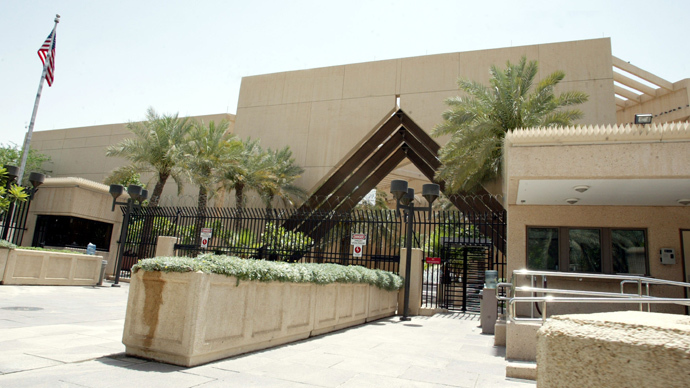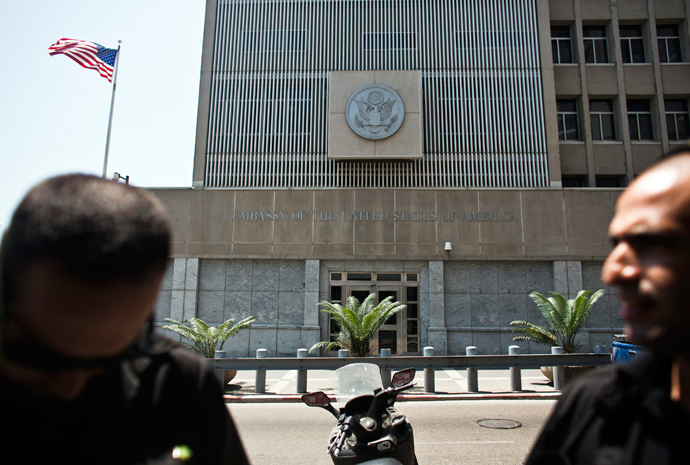Terror alert ‘reflects failure of US policy, shows Al-Qaeda power’

The US State Department’s travel alert and closure of more than 20 US embassies in Muslim countries are the result of a failure of US policy in the Arab world, and indicate how powerful Al-Qaeda has become there, author and historian Gerald Horne told RT.
Washington on Friday urged US travelers to take extra precautions due to the “continued potential for terrorist attacks” in the Middle East and North Africa. The alert, which warned of Al-Qaeda activity “possibly occurring and emanating from the Arabian Peninsula,” is applicable until at least August 31.
More than 20 US embassies and consulates have been temporarily
closed in Muslim countries due to a “specific threat,”
while the “increased threat” of Al-Qaeda terrorist attacks
has prompted the UK and Germany to shut down
their embassies in Yemen.
The global terror scares clearly show that the US policy in
Middle East and North Africa has backfired, says Horne, who is
Chair of History and African American Studies at the University
of Houston, Texas.
RT:With 21 embassies closing it doesn't appear that
the threat is that specific. What could we be talking about
here?
Gerald Horne: Recall September 11, 2012, when the US
Consulate in Benghazi, including US Ambassador Chris Stevens,
were subjected to attack. Mr Stevens, as you recall, was killed.
What this alert basically reflects is that US policy in that part
of the world has backfired. For example, in Syria, the United
States has encouraged, if not supported, a war against the
Damascus-based regime of [President Bashar] Assad. This has
involved a number of US nationals and European nationals going
into Syria to fight with the so-called jihadists. This is giving
a shot in the arm to Al-Qaeda backed forces, such as the al-Nusra
Front in Syria, which is tied to Al-Qaeda in Iraq… In the last
month [they] have been engaged in a spate of car bombings in
Baghdad and the surrounding region. So it seems to me that the
State Department alert reflects a failure of US policy.
RT:And this is indicative of how powerful Al-Qaeda has
become?
GH: Absolutely. The rumors about Al-Qaeda’s death have
been greatly exaggerated. It is not only the fact that you have
the US collaborating with the so-called Islamists in 2011 to
overthrow Colonel Gaddafi in Libya. It is the fact that those
Islamists then spread their tentacles into neighboring Algeria,
where there was an attack on an energy installation a few months
ago, and into neighboring Niger, where the so-called Islamists
attacked a uranium facility leading to a number of deaths. And
into neighboring Mali where they took over basically Northern
Mali before being expelled by the French forces. All this is a
direct outgrowth, and a direct result of a failed US policy.
RT:What are the consequences of these embassies being
shut? Could they be closed for a longer period - beyond
Sunday?
GH: It is unclear how long these embassies and consulates
will be closed down. But August is the month when US nationals,
generally speaking, take vacations - and many of them take
vacations and tours in that part of the world. Now with US
embassies and consulates basically shuttered, this means that if
they encounter any difficulties abroad they will not be able to
go to their taxpayer-supported embassies and consulates to get
assistance.
RT:Apart from embassies, what else or who else could
be a target?
GH: Well, I am afraid to say, there might even be attacks,
let’s hope not on the US mainland. I recall when there was a
similar alert a few years ago, you had armed guards with machine
guns in the Los Angeles airport, for example, because they were
expecting some kind of attack. Obviously there are all sorts of
US corporate facilities in that region that could be subjected to
attack. It is a very dangerous turn of events.
RT:Is this a sign that US intelligence is actually
working?
GH: Well, we’ll know within days or weeks. I don’t think
so. Despite the drones, and the National Security Agency which
monitors the Internet and bugs telephone calls, it is still
astonishing how much the US intelligence agencies do not know
about those who are plotting against US interests.

The statements, views and opinions expressed in this column are solely those of the author and do not necessarily represent those of RT.
The statements, views and opinions expressed in this column are solely those of the author and do not necessarily represent those of RT.












